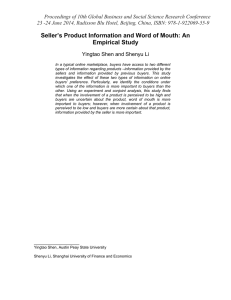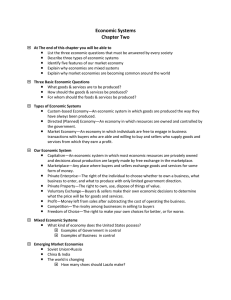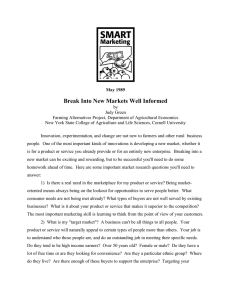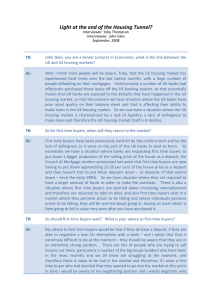What
advertisement
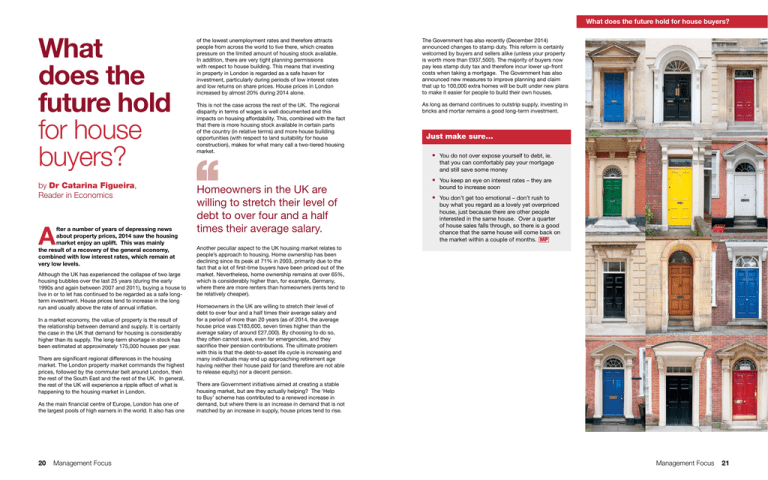
What does the future hold for house buyers? What does the future hold for house buyers? by Dr Catarina Figueira, Reader in Economics A fter a number of years of depressing news about property prices, 2014 saw the housing market enjoy an uplift. This was mainly the result of a recovery of the general economy, combined with low interest rates, which remain at very low levels. Although the UK has experienced the collapse of two large housing bubbles over the last 25 years (during the early 1990s and again between 2007 and 2011), buying a house to live in or to let has continued to be regarded as a safe longterm investment. House prices tend to increase in the long run and usually above the rate of annual inflation. In a market economy, the value of property is the result of the relationship between demand and supply. It is certainly the case in the UK that demand for housing is considerably higher than its supply. The long-term shortage in stock has been estimated at approximately 175,000 houses per year. There are significant regional differences in the housing market. The London property market commands the highest prices, followed by the commuter belt around London, then the rest of the South East and the rest of the UK. In general, the rest of the UK will experience a ripple effect of what is happening to the housing market in London. As the main financial centre of Europe, London has one of the largest pools of high earners in the world. It also has one 20 Management Focus of the lowest unemployment rates and therefore attracts people from across the world to live there, which creates pressure on the limited amount of housing stock available. In addition, there are very tight planning permissions with respect to house building. This means that investing in property in London is regarded as a safe haven for investment, particularly during periods of low interest rates and low returns on share prices. House prices in London increased by almost 20% during 2014 alone. The Government has also recently (December 2014) announced changes to stamp duty. This reform is certainly welcomed by buyers and sellers alike (unless your property is worth more than £937,500!). The majority of buyers now pay less stamp duty tax and therefore incur lower up-front costs when taking a mortgage. The Government has also announced new measures to improve planning and claim that up to 100,000 extra homes will be built under new plans to make it easier for people to build their own houses. This is not the case across the rest of the UK. The regional disparity in terms of wages is well documented and this impacts on housing affordability. This, combined with the fact that there is more housing stock available in certain parts of the country (in relative terms) and more house building opportunities (with respect to land suitability for house construction), makes for what many call a two-tiered housing market. As long as demand continues to outstrip supply, investing in bricks and mortar remains a good long-term investment. Just make sure… • You do not over expose yourself to debt, ie. that you can comfortably pay your mortgage and still save some money Homeowners in the UK are willing to stretch their level of debt to over four and a half times their average salary. • You keep an eye on interest rates – they are bound to increase soon • You don’t get too emotional – don’t rush to buy what you regard as a lovely yet overpriced house, just because there are other people interested in the same house. Over a quarter of house sales falls through, so there is a good chance that the same house will come back on the market within a couple of months. MF Another peculiar aspect to the UK housing market relates to people’s approach to housing. Home ownership has been declining since its peak at 71% in 2003, primarily due to the fact that a lot of first-time buyers have been priced out of the market. Nevertheless, home ownership remains at over 65%, which is considerably higher than, for example, Germany, where there are more renters than homeowners (rents tend to be relatively cheaper). Homeowners in the UK are willing to stretch their level of debt to over four and a half times their average salary and for a period of more than 20 years (as of 2014, the average house price was £183,600, seven times higher than the average salary of around £27,000). By choosing to do so, they often cannot save, even for emergencies, and they sacrifice their pension contributions. The ultimate problem with this is that the debt-to-asset life cycle is increasing and many individuals may end up approaching retirement age having neither their house paid for (and therefore are not able to release equity) nor a decent pension. There are Government initiatives aimed at creating a stable housing market, but are they actually helping? The ‘Help to Buy’ scheme has contributed to a renewed increase in demand, but where there is an increase in demand that is not matched by an increase in supply, house prices tend to rise. Management Focus 21
